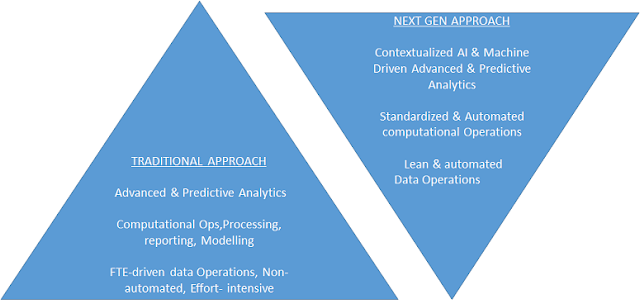Learnings from Cypher 2019 from Sanjay Parikh, EVP & Co-Founder of Indigene - by Kay S
“You Don’t Have To Be
Great To Start, But You Have To Start To Be Great.” –Zig Ziglar
This
seems to be something one should remember before we embark on learning
something we do not know. When we
sometimes find the process of learning long and tedious, the most important
thing to remember is that time will pass no matter what, so might as well spend
it learning something useful and upgrading your knowledge. These are thoughts that went through my
overwhelmed brain as I entered the Cypher Conference 2019 very recently during
my stint at REVA University. There were
a few sessions I was able to catch up on when I was there and I would like to
summarize my experience in the coming days as I felt that all learnings should
be shared be it small or large as you never know who might find it relevant to
their lives. I would like to serve this
as an attempt to document the learning I had regarding the upcoming trends and
breakthroughs in the world of IoT, Artificial Intelligence, Machine Learning, and
Analytics.
Some
of the most important points that I gathered from the sessions that I did
attend was:
1. In order to make any AI/ML successful, one
should always pay attention to the business needs and then ensure that the end
customer needs are accounted for.
2. One
of the differentiating factors of this learning was that to think that AI/ML
will replace human beings. This could
never be more farther than the truth.
The truth of the fact is that AI/ML are tools or programs that have been
invented by human beings and hence they will always be in control of
these. One of the most apt statements by
renowned Neurosurgeon, Dr. Ajay Bakshi did indeed drive the seriousness of
responsibility and accountability in AI.
He stated, “Do not make artificial intelligence so intelligent that it
starts controlling Cognitive intelligence by thinking for itself which can be
disastrous.” AI can only become a tool
never a replacement to a human being.
One
of the first sessions, I attended is summarized here below and currently, as I have
joined IPL, an organization geared towards building product leaders, this
seemed all the more relevant to the cohorts who are pursuing their career in
product leadership.
Sanjay Parikh, EVP &
Co-Founder of Indigene on product commercialization in Life Sciences in the age
of Big Data
Mr.
Parikh shed light on the importance of data and the path taken for production
commercialization with the amount of huge data that is available today. The emergence of data he stated starts with Research
& development, regulatory affairs, Market access, Medical affairs, and
lastly sales and marketing. The various
forms of data that exist in the above areas are biological data, clinical data,
regulatory data, medical data, real world data, commercial data, payor data,
social media, and data from wearables.
The volume and velocity of data amounts to 463 EB/Day from IoT and
connected devices and 1100+ TB per lifetime from Genetic/Clinical and exogenous
factors which come in both structured and unstructured form as per IDC data. He spoke about advanced analytics in that the
potential business impact in Lifesciences. As per the Mckinsey report, the
potential EBITDA impact of advanced analytics on these departments are as
below:
Research
and early development - 12 - 25%
Development,
regulatory & Safety - 13
- 20%
Manufacturing and Supply Chain - 4
- 8%
Market
access, Commercial, and medical - 15 –
23%
However,
he stated most pharma executives are unsatisfied with the analytics maturity of
their companies; 54% believe that their current data and analytics capability
is not meeting the needs of the organization, and 60% cite lack of access to
the right data as the biggest barrier to increasing use of real world
evidence. He explained the traditional
approach of analytics acceleration and automation versus Next Gen approach as
below:
Analytics in the Life
Sciences – A wide Spectrum of Opportunities
DISEASE INSIGHTS – UNLOCKING VALUE FROM REAL WORLD DATA
DISEASE INSIGHTS – UNLOCKING VALUE FROM REAL WORLD DATA
- Timely diagnosis of some
potentially serious conditions is critical but frequently proves difficult as
the symptoms are rarely indicative of the disease
- Early diagnostic determinants of the disease are key to improving patient’s prognoses.
He
then spoke on customer segmentation using AI for Insights on Analytics ready
data sets for exploratory data analysis with variable selection and data
summary. After this, he moved on to
target variable creation for Brand Adoption and Patient Adherence. Then comes Predication Score Approach
comprising of training set, Mt. Algorithm selection and validation set which in
turn trains the model by model diagnosis and performance evaluation. Insights and recommendations will be given as
below:
Confusion Matrix
|
Predicted
Non-adherence
|
Predicted
Adherence
|
Actual
Non-adherence
|
78%
|
22%
|
Actual
Adherence
|
31%
|
69%
|
Hope you enjoyed this post and get some insights from it. Something more from my desk from a different speaker tomorrow. So long folks.
- By Kay S
**All views are of the speaker mentioned above.







Comments
Post a Comment